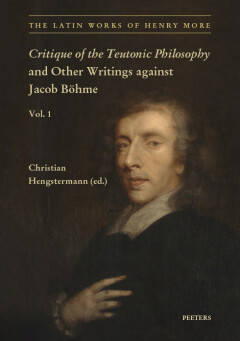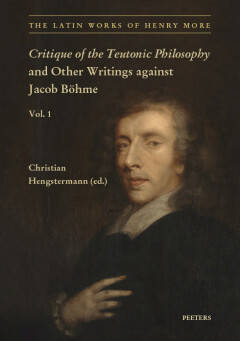
Bedankt voor het vertrouwen het afgelopen jaar! Om jou te bedanken bieden we GRATIS verzending (in België) aan op alles gedurende de hele maand januari.
- Afhalen na 1 uur in een winkel met voorraad
- Gratis thuislevering in België vanaf € 30
- Ruim aanbod met 7 miljoen producten
Bedankt voor het vertrouwen het afgelopen jaar! Om jou te bedanken bieden we GRATIS verzending (in België) aan op alles gedurende de hele maand januari.
- Afhalen na 1 uur in een winkel met voorraad
- Gratis thuislevering in België vanaf € 30
- Ruim aanbod met 7 miljoen producten
Zoeken
Critique of the Teutonic Philosophy and Other Writings Against Jacob Bohme
Text, Translation and Introduction
Christian Hengstermann, Douglas Hedley
€ 159,45
+ 318 punten
Omschrijving
The first volume of the series assembles More's writings against the Christian mystic Jacob Bohme. More engaged critically with Bohme's daring, yet exceptionally dark and elusive, writings for four decades. His principal work on the influential German author is his epistolary treatise Critique of the Teutonic Philosophy addressed to his "heroine pupil" Anne Conway. Not only does it provide a critical, albeit surprisingly sympathetic, account of the German mystic's riveting vision of the cosmic drama of divine being and becoming, but More's answers to the addressee's five quaestiones or "queries" amount to a sustained Neoplatonist interpretation of Bohme's theosophical cosmology as well. Alongside a first bilingual edition of the Critique of the Teutonic Philosophy, this volume contains all the Bohme-related chapters in More's earlier poetry and prose. A substantial introduction places More's important late work in the context of the contemporary English Behmenists' editorial project of a complete translation of the Teutonic Philosopher's Writings. This first volume of the Latin Works of Henry More makes accessible a particularly seminal work of the Cambridge Platonist which exerted massive influence upon G.W. Leibniz and the later Idealist and Romantic Bohme enthusiasts in Germany and beyond.
Specificaties
Betrokkenen
- Auteur(s):
- Uitgeverij:
Inhoud
- Aantal bladzijden:
- 374
- Taal:
- Engels
- Reeks:
- Reeksnummer:
- nr. 1
Eigenschappen
- Productcode (EAN):
- 9789042949874
- Verschijningsdatum:
- 6/02/2024
- Uitvoering:
- Paperback
- Formaat:
- Trade paperback (VS)
- Afmetingen:
- 170 mm x 250 mm
- Gewicht:
- 1133 g

Alleen bij Standaard Boekhandel
+ 318 punten op je klantenkaart van Standaard Boekhandel
Beoordelingen
We publiceren alleen reviews die voldoen aan de voorwaarden voor reviews. Bekijk onze voorwaarden voor reviews.









